Today’s police force is a powerful organization that has many department locations, modern technology, and government backing and funding. However, a lot of effort, logistics, and lawmaking went into developing the efficient, large force we have now. The police force we have in place today is one that we take for granted in the sense of its size, coverage, and power. The police force of yesterday was underfunded, lacked authority, and was a ragtag bunch of men.
The “feet” of today’s police force stand on the shoulders of these great men who took to policing the towns and cities because they wanted a safe haven for their families to live and prosper. They may or may not have understood that a safe environment meant businessmen would find the region attractive enough to set up their ventures. That they would hire employees and draw more people. That an economy would emerge.
These were unknown “side effects” of providing safety to friends and family. Its not because they lacked foresight, but these early, industrious men were simply very practical. Their feet were on the ground. There was an immediate and present issue: brigands, bandits, and criminal minds who had ill-will.
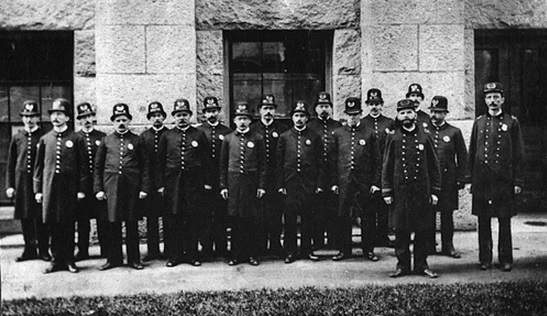
The New World represented a massive opportunity to those on the other side of the Atlantic. A place free from repression, freedom to practice your particular religious bent, and land with monumental, untapped natural resources. Alas, this very economic opportunity also attracts the ill intended. When Old Dartmouth in general and Bedford village specifically began to grow into larger populated areas, it was an organic part of the process to have some type of law enforcement.
The first historical mention of any sort of law enforcement in the New World is the New York Sheriff’s Office which was founded in 1626. That’s pretty darn early on in the nation’s history. Regionally the first mention of a policing force, official or otherwise, is in 1630 at Boston.
In 1665, Old Dartmouth had representation at Old Colony Court, Plymouth by one of the original proprietors of the Dartmouth land deed, John Russell – likely, but not proven, the son of Ralph Russell. This is the same family that gave Russell’s Mills its name.
John Russell served in this capacity from 1665-1683, excepting the years 1666 and 1673 where another of the original proprietors, John Cooke took over. Yes, the very same John Cooke that arrived to the New World aboard the Mayflower and lived in Fairhaven near present day Oxford School. Other representatives to follow – names well-known to anyone who follows local history – were Joseph Tripp and Seth Pope.
The first law enforcement officers were sheriffs, constables and nightwatchmen – modeled after the existing English law enforcement organizations. These three groups had their specialties in providing services, security and safety to the towns and cities.
The sheriffs covered large expanses of territory to deliver legal documents, commonly serving summonses and subpoenas. These documents were generally for evictions, collecting taxes, and court appearances. Interestingly the word “sheriff” is a corruption of “shire-reeves.”
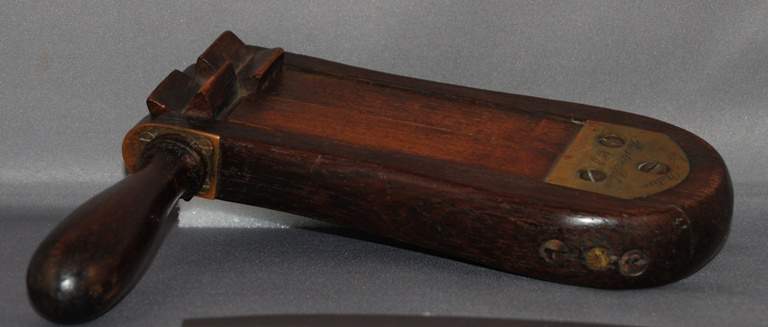
A shire – a term familiar to anyone who has read or watched The Lord of the Rings – is a small tract of land in England or Australia, somewhat equivalent to our “county.” While we don’t use the term in America much today, it was used early on in British America and we see its remnant in New Hampshire. A “reeve” was a senior official that could serve in a manor, district or….shire.
The constables’ duties differed somewhat in that while they could make arrests, they were especially on the watch for health hazards, sanitation issues and bringing folks to court – often for religious “offenses” like cursing or working on the Sabbath. The role of constables today can differ greatly from state to state. Some have little to no law enforcement power and simply serve documents, and in other states like Mississippi or Alaska they have greater law enforcement powers.
Any town that grew in size, would develop a small policing force that consisted of mainly volunteers – a sort of local militia. These nightwatchmen were the precursor to what would become the police department. The word “police” comes from the Middle French policer first used some time in the 1580s and means to “watch over,” or “guard.”
In this sense, the first night watchmen did exactly that: they patrolled the streets to watch for suspicious activity, and especially for fires which were relatively common. Especially pivotal to security of the town and safety of its denizens was the night watch – those with criminal intent were most active under cover of darkness. They would alert denizens with a cry, whistle or wooden rattle and would make arrests where appropriate.
While the the watchmen were primarily a volunteer force, sheriffs were appointed by the governor, and the constables were either elected or appointed. The sheriffs and constables wouldn’t necessarily receive a salary, but typically receive per diem pay – let’s say upon successfully delivery of a document or ensuring a person’s appearance at court.
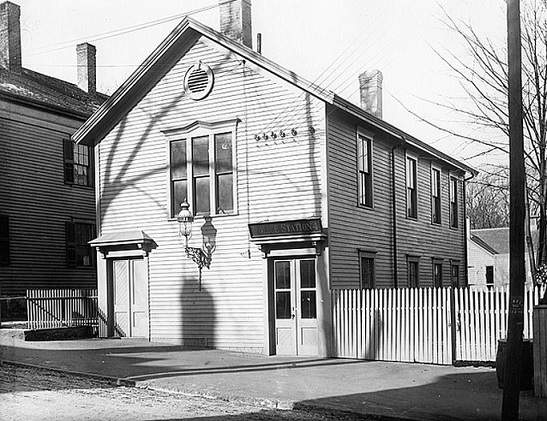
This lack of pay for the watchmen created a social dilemma of its own. The watchmen found themselves serving fines and arresting the poor – often people they knew. The job of keeping the city safe had evolved into arresting and fining the poor – not a task they had signed up for, and certainly not one worth doing for no cost.
As Bedford and Oxford villages burgeoned because of the whaling industry, a large economy grew to support it. As a seaport many visiting sailors from afar would arrive daily. Being a police officer in these conditions became increasingly more dangerous and the workload grew. Combine all these factors with no pay, and it was a no-brainer that something had to give.
Precedence was made in 1794 at Philadelphia where a warden – an early version of the police chief – was appointed to hire the watchmen. Both would be paid by the city with taxes – a concept that many towns and cities would subsequently incorporate.
This funding not only made the burden of finding staff easier, but meant that in some cases, the watchmen could utilize an official building as opposed to using a library, school, bank or even grocery store.
The same year that Philadelphia began to fund a policing force, New Bedford did the same under the very generally monikered “Bedford Association.” Their primary role was to be on the watch for fires, and protect businesses. It wouldn’t be until 1824 that the Bedford Association would be called by the equally unimaginative “Nightwatch.”
As whaling and other industries boomed, the increase in economic well-being meant there was an increase in law enforcement funding…and an increase in the darker activities. In 1847, New Bedford was incorporated and constabulary positions and duties were added to the “Nightwatch.”

Finally, in 1876 the New Bedford Police Department would be officially instituted with a staff of 26 regular officers, and 83 part-timers. Its first police chief was Henry Hathaway. Today there are four departments operating in the city.
While we still have sheriffs and constables today, the Police Officer has taken on far more duties and responsibilities that its earlier incarnation, the watchmen. They have more power, are better armed, more mobile and responsive, and no more wooden rattle!
New Bedford has always had a dark history and still does today. Without the “Watchmen” the city of New Bedford would probably be a lawless, chaotic city and a far more dangerous place than it is. While many citizens have a distrust of the Police Department due to the actions of a small minority of bad police officers, all can agree that they would be grateful for their presence in a time of need.
The New Bedford Police Department is full of officers that put their lives on the line on a daily basis for the safety and well-being of its citizens. It’s a service that many take for granted, but a visit to many other countries on earth would lend an alternative perspective. Many nations have no police presence, entire police forces owned by criminal organizations, or a police force that is powerless or uninterested in protecting the people and businesses. Today’s force provides New Bedford with a large measure of safety, is incredibly responsive, and play an integral role in a first world society. In fact, without their presence we could not have a first world society and businesses would not feel New Bedford is an atmosphere that they could prosper in.
So, while the duties, uniforms and technology have changed, the role of New Bedford’s “Watchmen” has not. They provide safety for their all people, allow businesses to prosper in a safe environment, and are there when you need them.

All of the photographs, except where noted, are due to the generosity of Spinner Publications.
 New Bedford Guide Your Guide to New Bedford and South Coast, MA
New Bedford Guide Your Guide to New Bedford and South Coast, MA
















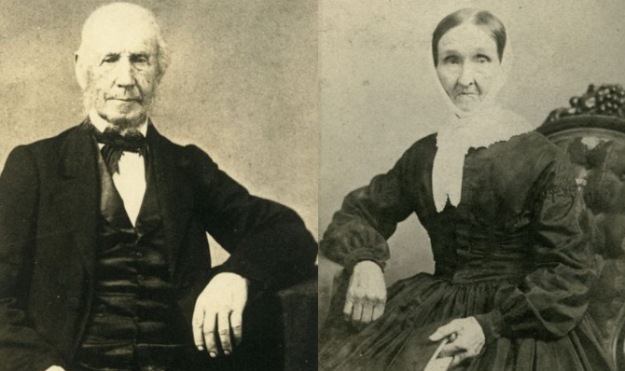
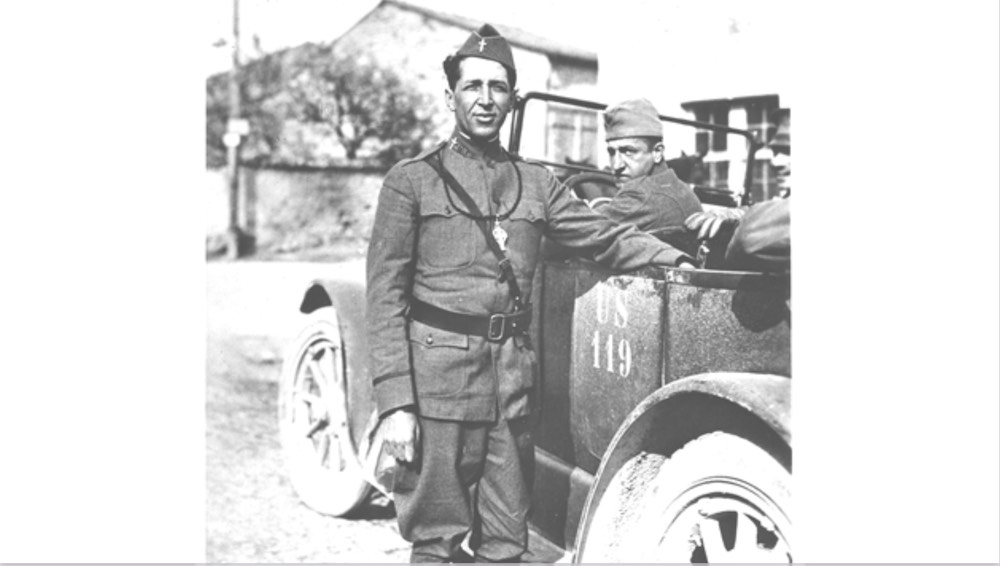

Is it me or is crime in New Bedford way out of control? Seems like good cops, bad leadership.